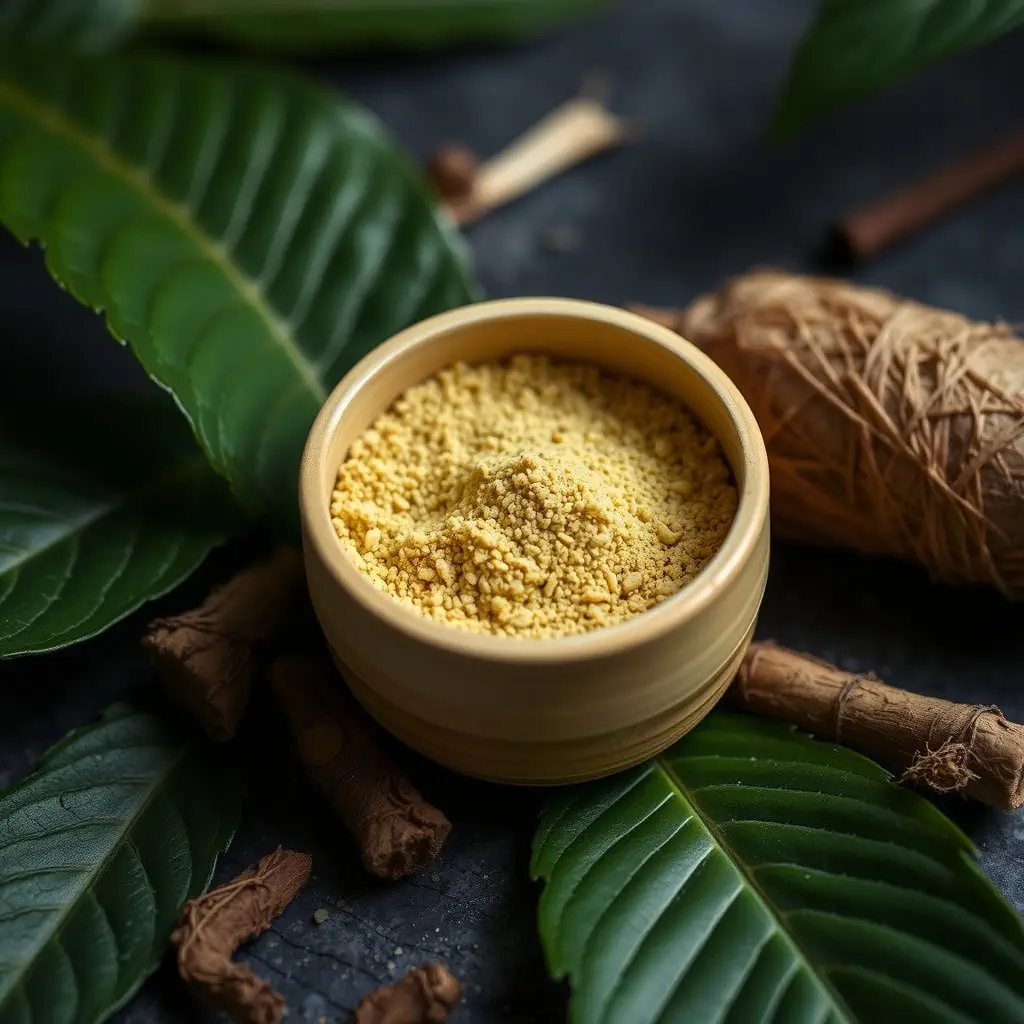Kratom, derived from the Mitragyna speciosa tree and traditionally used in Southeast Asia, contains compounds like mitragynine and 7-hydroxymitragynine that may alleviate anxiety symptoms through interactions with brain receptors. Its effects on individuals can vary greatly due to differences in physiology and psychology. While some users report uplifting and energizing benefits from strains like Maeng Da and White Vein kratom, it's essential to approach its use with caution and consult healthcare professionals beforehand due to potential interactions with other substances and the risk of side effects or dependence. The legal status of kratom is region-specific, so users must comply with local laws. Kratom could be a natural alternative to pharmaceuticals for managing anxiety, but it should be integrated into an overall stress management plan that includes mindfulness, exercise, and therapy, and monitored for tolerance development over time. It's crucial to source kratom from reputable providers, maintain its potency through proper storage, and understand the full scope of its effects on an individual basis within a comprehensive approach to health and well-being.
Discovering effective stress relief techniques is a journey toward maintaining mental well-being in our fast-paced world. This article delves into the potential of Kratom as a natural approach to managing anxiety, offering insights through its sections on the science behind its effects and how to safely incorporate it into your daily life. Explore the nuances of using Kratom for anxiety responsibly and learn about the best practices for integrating this substance into your stress management routine.
- Exploring the Role of Kratom in Managing Anxiety: A Comprehensive Guide
- Kratom's Mechanisms: Understanding Its Effects on Stress and Anxiety
- Integrating Kratom into Your Routine for Optimal Stress Relief: Safety and Best Practices
Exploring the Role of Kratom in Managing Anxiety: A Comprehensive Guide
Kratom, a plant native to Southeast Asia, has garnered attention in various wellness circles for its potential role in managing anxiety. Its leaves contain compounds that can interact with the brain and nervous system in ways that may influence mood and stress levels. When considering kratom for anxiety, it’s crucial to approach it with a nuanced understanding of its effects and to use it judiciously under professional guidance. Mitragynine and 7-hydroxymitragynine, the primary alkaloids found in kratom, have been studied for their potential anxiolytic properties, which may help alleviate feelings of nervousness and worry without the sedative effects often associated with conventional anxiety medications.
Users exploring kratom for anxiety typically focus on strains that are known to have a more uplifting and energizing effect, such as Maeng Da or White Vein varieties. These strains may provide a sense of calm and well-being, potentially aiding in the management of daily stressors. However, it’s important to note the complex nature of kratom’s interactions with individual physiology and psychology; what works for one person may not have the same effect on another. Additionally, the legal status of kratom varies by region, and its use should always align with local laws and regulations. Prospective users are advised to consult healthcare professionals before incorporating kratom into their anxiety management routine, as it can interact with other substances and may not be suitable for everyone. A comprehensive guide on kratom for anxiety would cover these considerations in detail, ensuring users have the necessary information to make informed decisions about its use.
Kratom's Mechanisms: Understanding Its Effects on Stress and Anxiety
Kratom, a plant native to Southeast Asia, has gained attention for its potential effects on stress and anxiety. Its leaves contain alkaloids, such as mitragynine and 7-hydroxymitragynine, which are thought to interact with various brain receptors that influence mood and pain perception. When it comes to managing anxiety, kratom for anxiety may offer a modulatory effect on the neurotransmitters GABA and glutamate, which can contribute to a calming sensation and alleviate symptoms of anxiousness. The alkaloids present in kratom are believed to stimulate the mu-opioid receptors, which could lead to anxiolytic effects, helping individuals experiencing anxiety find relief. It’s important to approach kratom with caution, as its effects can be highly subjective and vary based on dosage and individual physiology. Users should be aware of the legal status of kratom in their jurisdiction, as it is a controlled substance in some regions due to its opioid-like properties.
Incorporating kratom into a stress management routine requires careful consideration. While some users report significant benefits for anxiety and stress relief, it’s essential to consider the potential side effects and the risk of dependence or adverse reactions. The mechanisms by which kratom influences mood are complex and not fully understood; therefore, it is advisable to consult with a healthcare provider before incorporating kratom as part of an anxiety treatment plan. Additionally, exploring holistic approaches such as mindfulness, exercise, and therapy in conjunction with natural supplements like kratom can provide a well-rounded approach to managing stress and anxiety. Understanding the nuances of kratom’s effects on the body and mind is crucial for anyone interested in its use for anxiety relief.
Integrating Kratom into Your Routine for Optimal Stress Relief: Safety and Best Practices
Incorporating Kratom into a daily routine for stress relief and managing anxiety can be an effective strategy, provided it’s done responsibly and with consideration of its legal status in your region. Kratom, derived from the leaves of the Mitragyna speciosa tree, has been traditionally used in Southeast Asia for its stimulating and sedative effects. For individuals seeking natural alternatives to pharmaceuticals for anxiety, Kratom offers a promising option due to its alkaloids, mitragynine, and 7-hydroxymitragynine, which can influence the brain’s opioid receptors, potentially leading to reduced feelings of anxiety. When considering Kratom for anxiety, it is crucial to start with a low dose to gauge individual sensitivity, as the substance can have varying effects based on an individual’s unique biochemistry. It’s also essential to adhere to the recommended dosage to avoid overstimulation or adverse side effects.
To safely integrate Kratom into your routine for stress relief, it’s important to consult with a healthcare provider beforehand. This step ensures that Kratom won’t interact negatively with any medications you may be taking and that it aligns with your overall health goals. Additionally, maintaining a consistent dosing schedule can help regulate its effects on anxiety levels. It’s equally vital to monitor your body’s response over time, as tolerance can develop. Best practices for Kratom use include purchasing from reputable sources to avoid contaminants or adulterated products and storing it properly to maintain its potency. Furthermore, a holistic approach to stress management that combines Kratom with other healthy habits, such as regular exercise, a balanced diet, and adequate sleep, can enhance overall well-being and provide a more comprehensive solution for managing anxiety. Always prioritize safety, adhere to local laws, and be aware of the potential for dependence or addiction when considering Kratom for stress relief.
In conclusion, managing stress and anxiety through various methods is crucial for maintaining overall well-being. Among the approaches discussed, the role of Kratom in managing anxiety offers a potential avenue for individuals seeking relief. By delving into Kratom’s mechanisms and understanding its effects on stress and anxiety, readers can make informed decisions about its integration into their daily routines. It is imperative to approach any new substance with caution, adhering strictly to safety guidelines and best practices. For those exploring Kratom for anxiety, it is essential to consult healthcare professionals to ensure appropriate usage aligned with individual health needs. As such, this comprehensive guide serves as a foundational resource for those interested in leveraging Kratom as part of their stress relief arsenal. With the right knowledge and guidance, Kratom can be a valuable tool in the pursuit of tranquility amidst life’s challenges.






